转基因食品英文版
- 格式:ppt
- 大小:3.53 MB
- 文档页数:17
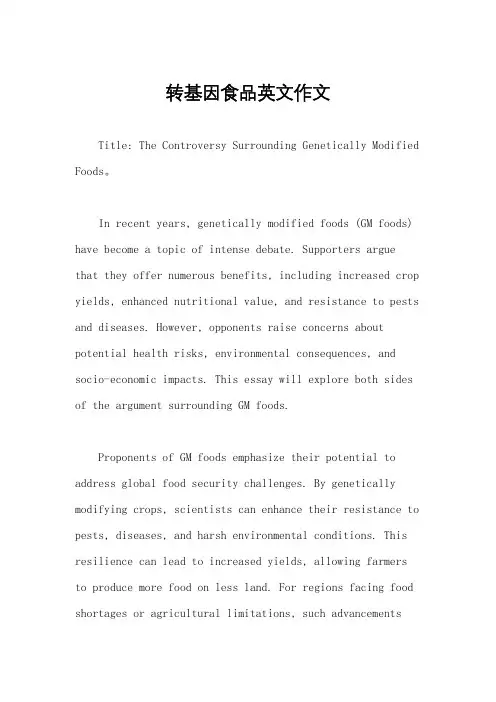
转基因食品英文作文Title: The Controversy Surrounding Genetically Modified Foods。
In recent years, genetically modified foods (GM foods) have become a topic of intense debate. Supporters arguethat they offer numerous benefits, including increased crop yields, enhanced nutritional value, and resistance to pests and diseases. However, opponents raise concerns about potential health risks, environmental consequences, and socio-economic impacts. This essay will explore both sides of the argument surrounding GM foods.Proponents of GM foods emphasize their potential to address global food security challenges. By genetically modifying crops, scientists can enhance their resistance to pests, diseases, and harsh environmental conditions. This resilience can lead to increased yields, allowing farmers to produce more food on less land. For regions facing food shortages or agricultural limitations, such advancementshold the promise of alleviating hunger and improving livelihoods.Moreover, genetically modified crops can be engineered to possess enhanced nutritional profiles. For example, scientists have developed varieties of rice enriched with essential vitamins and minerals, aiming to combat malnutrition in developing countries where rice is adietary staple. Such biofortified crops offer a sustainable solution to address micronutrient deficiencies and improve public health outcomes.Additionally, proponents argue that GM crops contribute to sustainable agriculture by reducing the need for chemical pesticides and herbicides. By incorporating traits that naturally repel pests or tolerate herbicides, farmers can minimize the use of harmful agrochemicals, thereby decreasing environmental pollution and mitigating health risks for both humans and ecosystems.Despite these potential benefits, critics of GM foods raise valid concerns regarding their safety and long-termimpacts. One major apprehension is the potential for unintended health consequences associated with consuming genetically modified organisms (GMOs). While regulatory agencies assert that GM foods undergo rigorous safety assessments, some studies suggest possible links toallergic reactions, organ damage, and other health issues. The long-term effects of GMO consumption remain a subject of ongoing research and debate.Furthermore, opponents argue that the widespread adoption of GM crops may lead to ecological imbalances and loss of biodiversity. Concerns arise over the potential for transgenic crops to crossbreed with wild relatives, leading to the proliferation of herbicide-resistant weeds or the displacement of native plant species. Such ecological disruptions could have far-reaching consequences for ecosystems and agricultural sustainability.Socio-economic considerations also feature prominently in the debate over GM foods. Critics argue that the dominance of GM seed companies, often accompanied by patenting and intellectual property rights, may exacerbateinequalities within the agricultural sector. Small-scale farmers, particularly in developing countries, may face economic hardships due to dependence on expensive GM seeds and associated agrochemicals. Additionally, concernspersist regarding the potential for corporate control over the global food supply, raising questions of food sovereignty and farmer autonomy.In conclusion, the debate over genetically modified foods encompasses a range of scientific, ethical, andsocio-economic considerations. While proponents highlight the potential benefits of GM crops in addressing food security, malnutrition, and sustainable agriculture, opponents raise valid concerns regarding safety, environmental impacts, and social equity. Moving forward, a balanced approach that considers both the potentialbenefits and risks of GM foods is essential to informpolicy decisions and ensure the responsible development and deployment of biotechnological innovations in agriculture.。
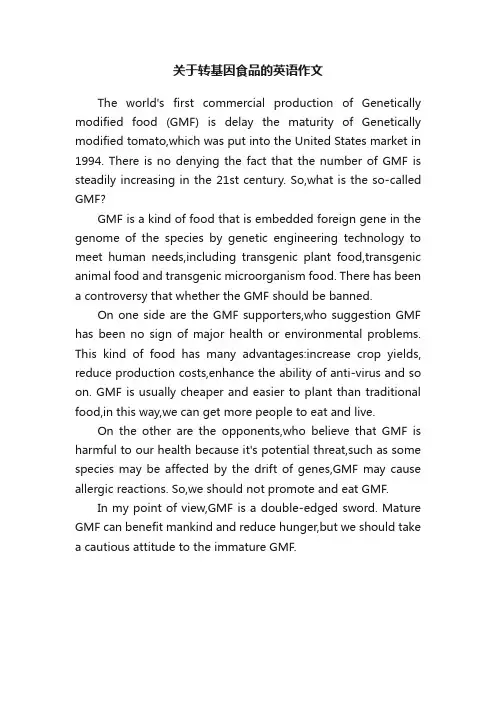
关于转基因食品的英语作文The world's first commercial production of Genetically modified food (GMF) is delay the maturity of Genetically modified tomato,which was put into the United States market in 1994. There is no denying the fact that the number of GMF is steadily increasing in the 21st century. So,what is the so-called GMF?GMF is a kind of food that is embedded foreign gene in the genome of the species by genetic engineering technology to meet human needs,including transgenic plant food,transgenic animal food and transgenic microorganism food. There has been a controversy that whether the GMF should be banned.On one side are the GMF supporters,who suggestion GMF has been no sign of major health or environmental problems. This kind of food has many advantages:increase crop yields, reduce production costs,enhance the ability of anti-virus and so on. GMF is usually cheaper and easier to plant than traditional food,in this way,we can get more people to eat and live.On the other are the opponents,who believe that GMF is harmful to our health because it's potential threat,such as some species may be affected by the drift of genes,GMF may cause allergic reactions. So,we should not promote and eat GMF.In my point of view,GMF is a double-edged sword. Mature GMF can benefit mankind and reduce hunger,but we should take a cautious attitude to the immature GMF.。
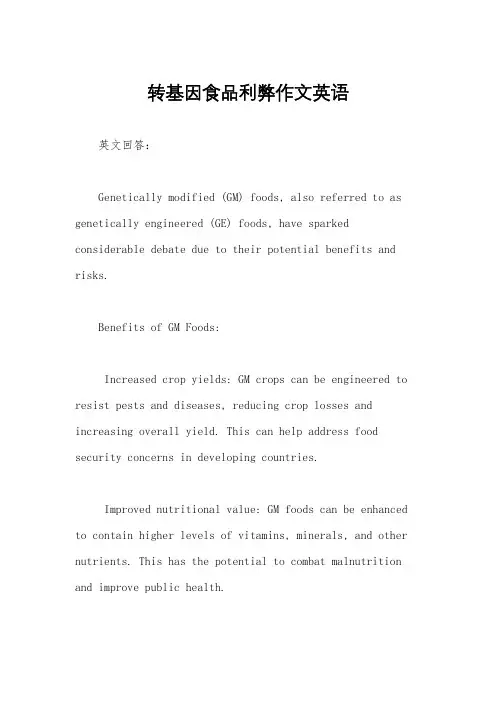
转基因食品利弊作文英语英文回答:Genetically modified (GM) foods, also referred to as genetically engineered (GE) foods, have sparked considerable debate due to their potential benefits and risks.Benefits of GM Foods:Increased crop yields: GM crops can be engineered to resist pests and diseases, reducing crop losses and increasing overall yield. This can help address food security concerns in developing countries.Improved nutritional value: GM foods can be enhanced to contain higher levels of vitamins, minerals, and other nutrients. This has the potential to combat malnutrition and improve public health.Resistance to environmental stressors: GM crops can be engineered to tolerate drought, heat, and other environmental stressors. This can increase agricultural productivity in challenging environments and reducereliance on synthetic fertilizers and pesticides.Risks of GM Foods:Health concerns: Critics argue that the long-term health effects of consuming GM foods are not fully understood. Concerns include potential allergies, increased toxicity, and antibiotic resistance due to the insertion of foreign genes.Environmental impact: GM crops can cross-pollinate with non-GM varieties, potentially introducing novel genes into natural ecosystems. This raises concerns about unintended consequences on biodiversity and gene flow.Economic issues: The development and commercialization of GM seeds can involve significant intellectual property rights and control by biotechnology companies. This cancreate concerns about farmer autonomy and market competition.Weighing the Benefits and Risks:The debate over GM foods is complex and requirescareful consideration of the potential benefits and risks. While GM foods have the potential to address food security and improve nutrition, concerns about health and environmental impacts must be thoroughly evaluated through rigorous scientific research and oversight.中文回答:转基因食品利弊。
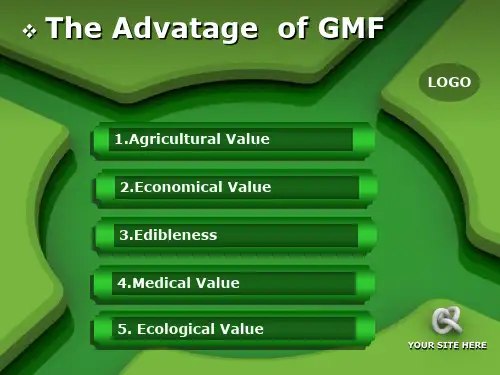
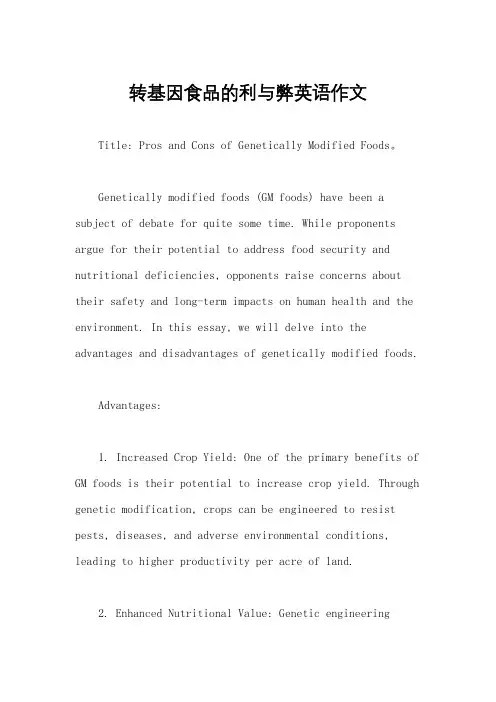
转基因食品的利与弊英语作文Title: Pros and Cons of Genetically Modified Foods。
Genetically modified foods (GM foods) have been a subject of debate for quite some time. While proponents argue for their potential to address food security and nutritional deficiencies, opponents raise concerns about their safety and long-term impacts on human health and the environment. In this essay, we will delve into the advantages and disadvantages of genetically modified foods.Advantages:1. Increased Crop Yield: One of the primary benefits of GM foods is their potential to increase crop yield. Through genetic modification, crops can be engineered to resist pests, diseases, and adverse environmental conditions, leading to higher productivity per acre of land.2. Enhanced Nutritional Value: Genetic engineeringenables the enrichment of crops with essential nutrients, such as vitamins and minerals. For example, Golden Rice, engineered to produce beta-carotene, addresses vitamin A deficiency in regions where rice is a staple food.3. Reduced Dependency on Pesticides: GM crops can be engineered to possess inherent resistance to pests and diseases, thereby reducing the need for chemical pesticides. This not only minimizes environmental pollution but also lowers production costs for farmers.4. Extended Shelf Life: Some genetically modifiedfruits and vegetables exhibit traits that prolong theirshelf life, reducing food wastage during storage and transportation. This is particularly advantageous in addressing hunger and malnutrition in remote areas.5. Environmental Sustainability: Certain GM crops are designed for enhanced nitrogen fixation or drought tolerance, reducing the need for excessive irrigation and fertilizers. This promotes sustainable agriculturepractices and conserves natural resources.Disadvantages:1. Health Concerns: Opponents of GM foods express apprehensions regarding their potential long-term health effects on humans. There are concerns about allergic reactions, antibiotic resistance, and unforeseen consequences of genetic modifications that may not manifest immediately.2. Environmental Risks: The cultivation of GM crops may pose environmental risks, such as the unintentional spread of genetically modified organisms (GMOs) to wild plant populations, disrupting ecosystems and biodiversity. Additionally, the emergence of superweeds and superbugs resistant to GM crop traits is a growing concern.3. Economic Implications: The dominance of GM crops in agricultural systems can lead to economic disparities, as small-scale farmers may face challenges accessing expensive GM seeds and technologies. Moreover, the patenting of genetically modified seeds by biotechnology corporationsraises issues of intellectual property rights and monopolistic control over agricultural production.4. Loss of Traditional Varieties: The widespread adoption of GM crops has led to the displacement of traditional crop varieties adapted to local environments and cultural practices. This loss of agricultural biodiversity diminishes resilience to pests, diseases, and climate change.5. Ethical Dilemmas: Genetically modifying organisms raises ethical questions regarding the manipulation of nature and the commodification of life. Concerns about corporate control over food production, transparency in labeling GM products, and the right of consumers to make informed choices are central to the ethical debate surrounding GM foods.In conclusion, genetically modified foods offer potential benefits in terms of increased crop yield, enhanced nutritional value, and environmental sustainability. However, they also pose significantchallenges and risks, including health concerns, environmental impacts, economic disparities, loss of biodiversity, and ethical dilemmas. As the debate continues, it is essential to weigh the advantages and disadvantagesof GM foods while ensuring robust regulatory frameworks and transparency in decision-making processes.。
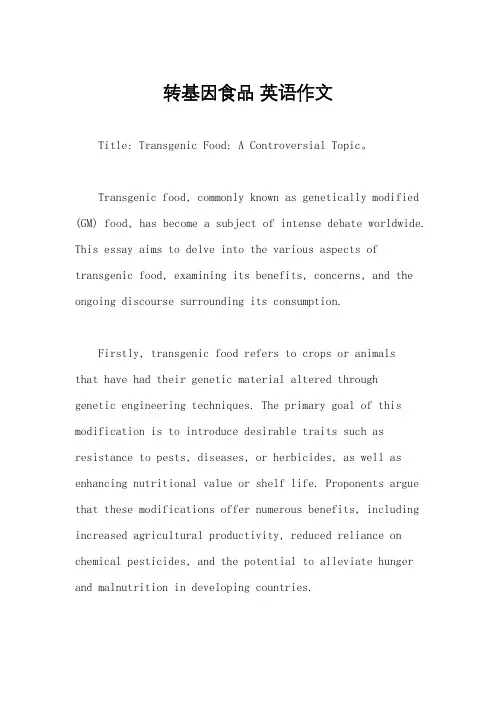
转基因食品英语作文Title: Transgenic Food: A Controversial Topic。
Transgenic food, commonly known as genetically modified (GM) food, has become a subject of intense debate worldwide. This essay aims to delve into the various aspects of transgenic food, examining its benefits, concerns, and the ongoing discourse surrounding its consumption.Firstly, transgenic food refers to crops or animalsthat have had their genetic material altered throughgenetic engineering techniques. The primary goal of this modification is to introduce desirable traits such as resistance to pests, diseases, or herbicides, as well as enhancing nutritional value or shelf life. Proponents argue that these modifications offer numerous benefits, including increased agricultural productivity, reduced reliance on chemical pesticides, and the potential to alleviate hunger and malnutrition in developing countries.One of the most significant advantages of transgenic crops is their ability to withstand harsh environmental conditions. For instance, crops engineered to be drought-resistant or salt-tolerant can thrive in regions withlimited water resources or saline soils, thereby expanding agricultural possibilities and ensuring food security inarid or marginal lands. Moreover, genetically modifiedcrops engineered to produce higher yields can help meet the growing demand for food due to population growth and changing dietary habits.In addition to improved agricultural productivity, transgenic food has the potential to address nutritional deficiencies. Biofortified crops, which are genetically modified to contain higher levels of essential nutrients such as vitamins and minerals, offer a promising solutionto combat malnutrition and related health problems, particularly in vulnerable populations. Golden Rice, for example, is genetically engineered to produce beta-carotene, a precursor of vitamin A, and could help prevent vitamin A deficiency-related blindness and mortality in regions where rice is a staple food.Despite these potential benefits, transgenic food remains a contentious issue due to various ethical, environmental, and health concerns. Critics argue that the long-term effects of consuming genetically modified organisms (GMOs) are not fully understood and raise apprehensions about potential risks to human health and the environment. There are concerns regarding the transfer of allergens or toxins from transgenic crops to humans, as well as the development of herbicide-resistant weeds and the loss of biodiversity.Moreover, the socioeconomic implications of transgenic food production have sparked debates over food sovereignty, farmer autonomy, and corporate control of the food system. The dominance of a few biotechnology corporations in the production and distribution of genetically modified seeds has raised concerns about farmers' dependency on patented seeds, as well as issues of seed saving, intellectual property rights, and access to seeds for small-scale farmers, particularly in developing countries.In conclusion, transgenic food is a complex and multifaceted issue that elicits divergent viewpoints and raises important questions about the future of agriculture, food security, and sustainability. While proponents emphasize its potential to address pressing challenges such as food scarcity and malnutrition, critics raise valid concerns about its safety, environmental impact, and socioeconomic implications. As the debate surrounding transgenic food continues, it is essential to foster transparent dialogue, rigorous scientific research, and comprehensive risk assessments to inform decision-making and ensure that the benefits outweigh the risks for both present and future generations.。
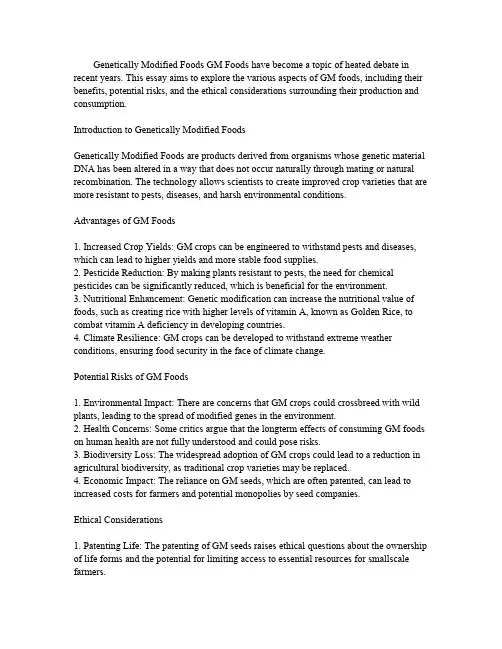
Genetically Modified Foods GM Foods have become a topic of heated debate in recent years.This essay aims to explore the various aspects of GM foods,including their benefits,potential risks,and the ethical considerations surrounding their production and consumption.Introduction to Genetically Modified FoodsGenetically Modified Foods are products derived from organisms whose genetic material DNA has been altered in a way that does not occur naturally through mating or natural recombination.The technology allows scientists to create improved crop varieties that are more resistant to pests,diseases,and harsh environmental conditions.Advantages of GM Foods1.Increased Crop Yields:GM crops can be engineered to withstand pests and diseases, which can lead to higher yields and more stable food supplies.2.Pesticide Reduction:By making plants resistant to pests,the need for chemical pesticides can be significantly reduced,which is beneficial for the environment.3.Nutritional Enhancement:Genetic modification can increase the nutritional value of foods,such as creating rice with higher levels of vitamin A,known as Golden Rice,to combat vitamin A deficiency in developing countries.4.Climate Resilience:GM crops can be developed to withstand extreme weather conditions,ensuring food security in the face of climate change.Potential Risks of GM Foods1.Environmental Impact:There are concerns that GM crops could crossbreed with wild plants,leading to the spread of modified genes in the environment.2.Health Concerns:Some critics argue that the longterm effects of consuming GM foods on human health are not fully understood and could pose risks.3.Biodiversity Loss:The widespread adoption of GM crops could lead to a reduction in agricultural biodiversity,as traditional crop varieties may be replaced.4.Economic Impact:The reliance on GM seeds,which are often patented,can lead to increased costs for farmers and potential monopolies by seed companies.Ethical Considerations1.Patenting Life:The patenting of GM seeds raises ethical questions about the ownership of life forms and the potential for limiting access to essential resources for smallscale farmers.2.Corporate Control:The dominance of a few large corporations in the GM seed market can lead to concerns about the control over global food production and the potential for exploitation.3.Consumer Choice:There is an ongoing debate about whether consumers should have the right to choose whether or not to consume GM foods,and whether labeling should be mandatory.ConclusionThe development and use of GM foods present a complex set of issues that require careful consideration.While they offer potential benefits such as increased yields and improved nutrition,they also come with potential risks and ethical dilemmas.It is crucial for policymakers,scientists,and consumers to engage in an informed dialogue to ensure that the benefits of GM technology are realized while mitigating any potential negative impacts.。
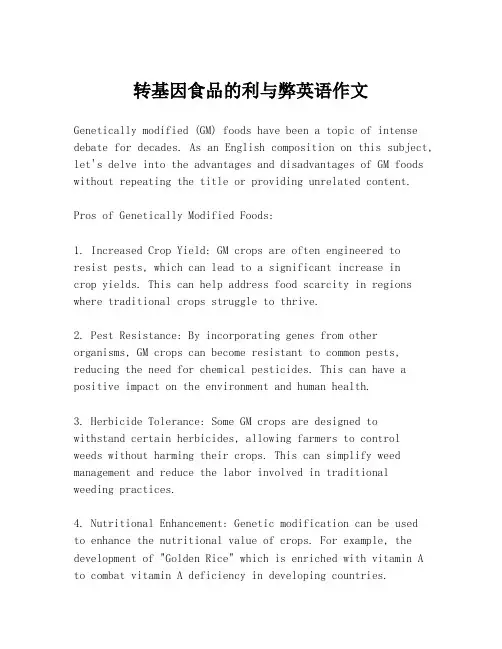
转基因食品的利与弊英语作文Genetically modified (GM) foods have been a topic of intense debate for decades. As an English composition on this subject, let's delve into the advantages and disadvantages of GM foods without repeating the title or providing unrelated content.Pros of Genetically Modified Foods:1. Increased Crop Yield: GM crops are often engineered toresist pests, which can lead to a significant increase incrop yields. This can help address food scarcity in regions where traditional crops struggle to thrive.2. Pest Resistance: By incorporating genes from other organisms, GM crops can become resistant to common pests, reducing the need for chemical pesticides. This can have a positive impact on the environment and human health.3. Herbicide Tolerance: Some GM crops are designed towithstand certain herbicides, allowing farmers to control weeds without harming their crops. This can simplify weed management and reduce the labor involved in traditional weeding practices.4. Nutritional Enhancement: Genetic modification can be usedto enhance the nutritional value of crops. For example, the development of "Golden Rice" which is enriched with vitamin A to combat vitamin A deficiency in developing countries.5. Climate Change Resilience: GM technology can potentially be used to create crops that are more resistant to extreme weather conditions, helping to secure food supplies in the face of climate change.Cons of Genetically Modified Foods:1. Environmental Concerns: There are fears that GM crops could crossbreed with wild plants, leading to the spread of modified genes through the ecosystem with unknown consequences.2. Health Risks: Some critics argue that GM foods could pose health risks, although scientific consensus has not found evidence to support this claim. However, the long-termeffects of consuming GM foods are still not fully understood.3. Dependence on Seed Companies: Farmers who use GM seeds often must purchase new seeds each growing season, as many are engineered not to reproduce. This can lead to a reliance on seed companies and reduce the diversity of crops.4. Economic Impact: The high cost of GM seeds can be abarrier for small farmers, potentially leading to a loss of biodiversity as traditional crops are replaced by GM varieties.5. Ethical and Social Issues: There are ethical concerns about the manipulation of nature at the genetic level and the potential for misuse of technology. Additionally, there areconcerns about the socio-economic impacts on farming communities.In conclusion, while GM foods offer potential benefits suchas increased yields and improved nutritional content, theyalso come with significant concerns regarding environmental impact, health, and socio-economic effects. As the technology continues to evolve, it is crucial for the scientific community, policymakers, and the public to engage in a balanced and informed discussion about the future of GM foods.。
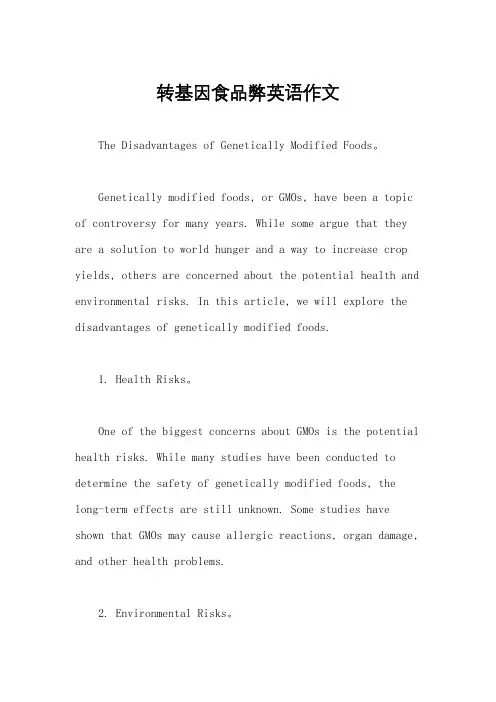
转基因食品弊英语作文The Disadvantages of Genetically Modified Foods。
Genetically modified foods, or GMOs, have been a topic of controversy for many years. While some argue that they are a solution to world hunger and a way to increase crop yields, others are concerned about the potential health and environmental risks. In this article, we will explore the disadvantages of genetically modified foods.1. Health Risks。
One of the biggest concerns about GMOs is the potential health risks. While many studies have been conducted to determine the safety of genetically modified foods, the long-term effects are still unknown. Some studies have shown that GMOs may cause allergic reactions, organ damage, and other health problems.2. Environmental Risks。
Another concern about GMOs is the potential environmental risks. GMOs are often designed to beresistant to herbicides and pesticides, which can lead to an increase in the use of these chemicals. This can have a negative impact on the environment and the organisms that live in it.3. Lack of Diversity。
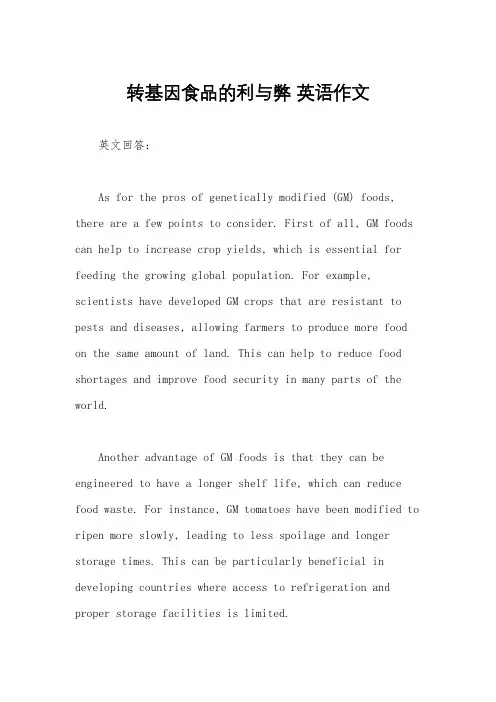
转基因食品的利与弊英语作文英文回答:As for the pros of genetically modified (GM) foods, there are a few points to consider. First of all, GM foods can help to increase crop yields, which is essential for feeding the growing global population. For example, scientists have developed GM crops that are resistant to pests and diseases, allowing farmers to produce more food on the same amount of land. This can help to reduce food shortages and improve food security in many parts of the world.Another advantage of GM foods is that they can be engineered to have a longer shelf life, which can reduce food waste. For instance, GM tomatoes have been modified to ripen more slowly, leading to less spoilage and longer storage times. This can be particularly beneficial in developing countries where access to refrigeration and proper storage facilities is limited.Furthermore, GM foods have the potential to be more nutritious and healthier. Scientists have been able to enhance the nutritional content of certain crops, such as adding more vitamins and minerals to rice. This can be especially beneficial for populations that suffer from malnutrition and dietary deficiencies.On the other hand, there are also some drawbacks to consider when it comes to GM foods. One of the main concerns is the potential for unintended harm to the environment and human health. For example, there is a fear that GM crops could crossbreed with wild plants, leading to the spread of modified genes into natural ecosystems. Additionally, there are worries about the long-term effects of consuming GM foods, as the full impact on human healthis not yet fully understood.Another drawback is the potential for corporate control over the food supply. Many GM seeds are patented by biotechnology companies, which can lead to a monopoly on the market and limited options for farmers. This can havenegative implications for small-scale farmers who may become dependent on a single company for their seeds and agricultural inputs.In conclusion, GM foods have the potential to address some of the world's food security and nutrition challenges, but they also come with potential risks to the environment and human health, as well as concerns about corporate control. It is important to carefully weigh the pros and cons of GM foods and consider the ethical, social, and environmental implications before fully embracing this technology.中文回答:说到转基因食品的利与弊,有一些要考虑的观点。
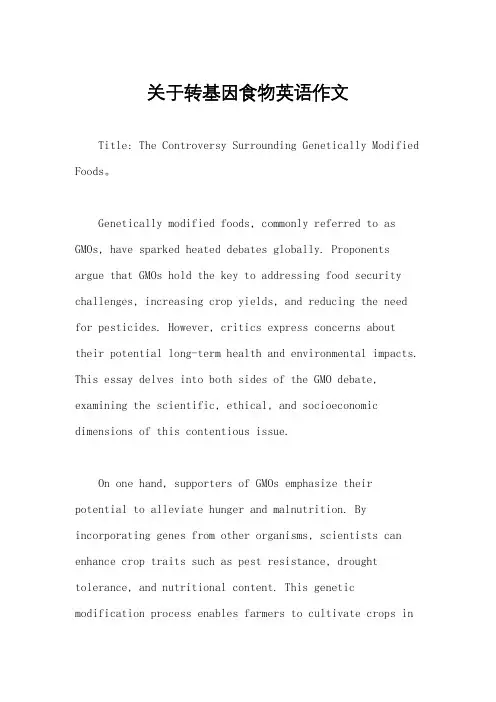
关于转基因食物英语作文Title: The Controversy Surrounding Genetically Modified Foods。
Genetically modified foods, commonly referred to as GMOs, have sparked heated debates globally. Proponents argue that GMOs hold the key to addressing food security challenges, increasing crop yields, and reducing the need for pesticides. However, critics express concerns about their potential long-term health and environmental impacts. This essay delves into both sides of the GMO debate, examining the scientific, ethical, and socioeconomic dimensions of this contentious issue.On one hand, supporters of GMOs emphasize their potential to alleviate hunger and malnutrition. By incorporating genes from other organisms, scientists can enhance crop traits such as pest resistance, drought tolerance, and nutritional content. This genetic modification process enables farmers to cultivate crops inharsh environments with minimal chemical inputs, thus boosting agricultural productivity and ensuring food availability for a growing global population.Moreover, advocates argue that GMOs offer environmental benefits by reducing the reliance on chemical pesticides and herbicides. Through genetic engineering, crops can be engineered to produce their own insecticides, thereby decreasing the need for harmful chemical treatments that pose risks to human health and ecosystems. Additionally, genetically modified crops can be designed to thrive in marginal lands, reducing the pressure to convert valuable natural habitats into farmland.However, opponents of GMOs raise valid concerns regarding their safety and potential unintended consequences. One major apprehension is the lack of long-term studies evaluating the health effects of consuming genetically modified foods. Critics argue that introducing foreign genes into crops may trigger allergic reactions or other unforeseen health issues, necessitating rigorous testing and regulatory oversight to ensure consumer safety.Furthermore, opponents highlight the socioeconomic implications of GMOs, particularly the concentration of power and control in the hands of a few agrochemical corporations. The widespread adoption of genetically modified seeds often leads to increased dependency on patented technologies, exacerbating inequalities within the agricultural sector and threatening the livelihoods of small-scale farmers. Additionally, the dominance of GMOs in the market can diminish biodiversity by favoring monoculture practices and displacing traditional crop varieties adapted to local ecosystems.Ethical considerations also play a significant role in the GMO debate, with concerns raised about the ethical implications of manipulating the genetic makeup of organisms. Critics argue that altering the genetic code of plants and animals blurs the boundaries of natural species barriers, raising questions about the moral responsibility of humans to respect the integrity of living organisms and ecosystems. Moreover, the patenting of genetically modified seeds raises ethical dilemmas regarding access to essentialresources such as seeds, which are fundamental to global food security.In conclusion, the debate surrounding genetically modified foods is multifaceted, encompassing scientific, ethical, and socioeconomic dimensions. While proponents emphasize the potential of GMOs to address food security challenges and reduce agricultural inputs, critics raise valid concerns about their safety, environmental impact, and ethical implications. Moving forward, it is essential to engage in informed dialogue and conduct comprehensive risk assessments to navigate the complex terrain of GMOs responsibly. Only through a balanced approach that considers both the benefits and risks can we ensure a sustainable and equitable food system for future generations.。
转基因食品看法英文作文英文:Transgenic foods, commonly referred to as genetically modified organisms (GMOs), have sparked intense debates globally. These discussions often revolve around their safety, ethical implications, and impact on the environment and economy. My view on transgenic foods is nuanced, considering both the potential benefits and concerns associated with their widespread use.On one hand, transgenic foods have the potential to address various agricultural challenges. For instance, genetically modified crops can be engineered to resistpests and diseases, reducing the need for harmful pesticides. This not only improves crop yields but also minimizes the environmental damage caused by conventional farming practices. In regions with food scarcity,genetically modified crops engineered for increased nutritional value could help combat malnutrition and hunger.Moreover, transgenic foods have the potential to enhance food security by increasing resilience to climate change. Through genetic modification, crops can be made more drought-tolerant or capable of thriving in poor soil conditions, ensuring stable yields even in adverse environmental conditions.However, despite these potential benefits, concerns regarding the safety of transgenic foods persist. Some argue that the long-term health effects of consuming genetically modified organisms are still uncertain. There are also worries about the potential for transgenes to spread to wild plant populations, leading to unintended ecological consequences.Additionally, the dominance of transgenic crops in agricultural systems could exacerbate issues of corporate control over seeds and agricultural practices. This raises questions about the socioeconomic impacts of widespread adoption of genetically modified crops, particularly for small-scale farmers who may become dependent on largebiotechnology corporations for seeds and agricultural inputs.In my view, the key lies in rigorous scientific research and transparent regulation to ensure the safety and responsible use of transgenic foods. While acknowledging the potential risks, I believe that genetically modified organisms can play a beneficial role in addressing global food security challenges if deployed responsibly.中文:转基因食品,通常被称为基因改造生物(GMO),在全球范围内引发了激烈的辩论。
转基因食品的英语作文英文回答:As for genetically modified (GM) foods, I have quite a mixed opinion. On one hand, I understand the potential benefits of GM foods, such as increased crop yield and resistance to pests and diseases. This can be especially important in areas where food shortages are a major issue. For example, in some parts of Africa, GM crops have been developed to withstand drought and pests, which can help to ensure a more reliable food supply.However, on the other hand, I also have concerns about the potential risks and long-term effects of consuming GM foods. There is still ongoing debate and research about the safety of GM foods, and some studies have raised questions about their potential impact on human health and the environment. For instance, there are worries about the effects of GM crops on biodiversity and the potential for unintended consequences, such as the development ofsuperweeds or the harm to non-target insects.In addition, there are also ethical and economic considerations to take into account. For example, there are concerns about the control of GM seeds by large corporations and the potential impact on small-scale farmers. Moreover, there are questions about the labeling of GM foods and the consumer's right to know what they are eating.In conclusion, while I can see the potential benefits of GM foods, I also believe that it is important to proceed with caution and to continue researching and monitoring the impact of GM foods on human health and the environment.中文回答:对于转基因食品,我有着各种不同的看法。
英语作文转基因食品Genetically Modified Foods: A Debate in the Modern Era。
In the fast-paced world of modern agriculture, genetically modified foods (GMOs) have become a subject of intense debate. As scientific advancements continue to reshape the agricultural landscape, the question of whether to embrace or reject GMOs remains a complex one, encompassing considerations from health, environmental, and economic perspectives.To understand the essence of this debate, it is crucial to delve into the fundamental concepts of GMOs. Genetically modified foods are those whose DNA has been altered in a laboratory to enhance desired traits such as resistance to pesticides, improved nutritional value, or increased yield. This technology, though groundbreaking, has raised concerns about its potential long-term impacts on human health andthe environment.On the health front, the primary concern revolves around the unknown consequences of consuming food with modified genetic makeup. Critics argue that long-term consumption of GMOs may lead to unknown health issues, such as allergies, digestive problems, or even more serious conditions. However, supporters counter this argument by citing scientific studies that have found no significant differences in the nutritional value or safety of GMOs compared to their non-modified counterparts. They maintain that GMOs have the potential to reduce hunger and malnutrition by increasing food production and enhancing nutrient content.The environmental implications of GMOs are also a matter of contention。
转基因食品弊英语作文Transgenic food, also known as genetically modified food (GM food), is a controversial topic that has sparked debates worldwide. This essay will explore the drawbacks of transgenic food.One of the primary concerns regarding transgenic foodis its potential impact on human health. Critics argue that genetically modified organisms (GMOs) could introduce new allergens or toxins into the food supply, leading to adverse health effects. Additionally, the long-term effects of consuming GMOs are still largely unknown, raising concerns about the potential for unforeseen health consequences.Furthermore, there are concerns about the environmental impact of transgenic food. The widespread use of GMOs has led to the emergence of "superweeds" and "superbugs" that are resistant to herbicides and pesticides, leading to increased chemical use in agriculture. This not only harmsthe environment but also poses risks to human health due to the potential exposure to these chemicals.Another significant drawback of transgenic food is its impact on biodiversity. GMOs have the potential to outcompete native species, leading to a loss of biodiversity. This can have far-reaching consequences for ecosystems and the services they provide, such as pollination and pest control.In addition to these concerns, there are also socio-economic issues associated with transgenic food. Critics argue that GMOs could lead to increased corporate control over the food supply, as companies that produce GMO seeds often hold patents on them. This could lead to higher prices for seeds and a loss of traditional farming practices, particularly in developing countries.In conclusion, transgenic food has several drawbacks, including potential risks to human health, environmental concerns, impacts on biodiversity, and socio-economic issues. While proponents argue that GMOs could help addressfood security challenges, it is essential to carefully consider these drawbacks and take steps to mitigate them.。
转基因食物的坏处英语作文英文回答:Genetically modified foods (GMFs) have emerged as a controversial topic in recent years, with concerns raised about their potential health risks and environmental impact. However, it is important to approach this issue with a balanced perspective, considering both the potentialbenefits and drawbacks of GMFs.Potential Health Risks.One of the main concerns surrounding GMFs is their potential to cause allergic reactions or other adversehealth effects in consumers. While traditional breeding methods can also introduce new allergens into the food supply, GMFs have the potential to transfer genes from one species to another, creating novel combinations that could trigger allergic responses in susceptible individuals.Moreover, the long-term health effects of consuming GMFs are still largely unknown. Some studies have suggested that certain genetically modified crops may have altered nutritional profiles or contain unintended substances that could have negative health consequences. However, it is important to note that these findings are often based on animal studies or small-scale human trials, and further research is needed to establish a definitive link between GMF consumption and adverse health effects.Environmental Concerns.GMFs have also raised concerns about their potential impact on the environment. The use of herbicide-resistant crops, for example, may lead to increased reliance on chemical weed control, which can have detrimental effects on biodiversity and soil health. Additionally, the introduction of genetically modified crops into natural ecosystems could potentially disrupt ecological balance by outcompeting native species or altering food webs.Another concern is gene transfer from geneticallymodified crops to wild relatives, creating "superweeds"that are resistant to herbicides or other pesticides. This could complicate weed management and reduce the effectiveness of chemical control methods. Moreover, the potential for genetically modified genes to spread to organic or non-GM crops through cross-pollination raises concerns about contamination and the loss of genetic diversity.Regulatory Measures.To address these concerns, regulatory agencies around the world have established strict protocols for the development and approval of GMFs. These protocols typically involve extensive safety assessments to evaluate potential health risks and environmental impact. The regulatory framework aims to ensure that GMFs meet the same safety and quality standards as conventional foods.Benefits of GMFs.Despite the concerns, GMFs also offer potentialbenefits that should be considered. Genetically modified crops can be engineered to enhance their nutritional value, increase their resistance to pests and diseases, andimprove their yield. These advancements can contribute to addressing global food security challenges and reducing the need for harmful pesticides.GMFs have also been used to create hypoallergenic foods, such as soybeans that are modified to remove allergens.This can improve the quality of life for individuals with food allergies. Additionally, genetically modified cropscan be engineered to produce therapeutic proteins or vaccines, offering potential medical advancements.Conclusion.The debate surrounding GMFs is complex and multifaceted. While there are valid concerns about potential health risks and environmental impact, it is important to approach the issue scientifically and consider the potential benefits as well. Regulatory frameworks play a crucial role in ensuring the safety and responsible use of GMFs. As researchcontinues, a balanced and informed approach will be essential to harness the potential benefits of GMFs while mitigating any risks.中文回答:转基因食品的缺点。
转基因食品英语作文Genetically Modified Foods。
Genetically modified foods, also known as GM foods, are foods produced from organisms that have had changes introduced into their DNA using the methods of genetic engineering. These modifications are typically intended to enhance the nutritional value, increase resistance to pests and diseases, or improve the overall growth and yield ofthe crops. The debate over the safety and ethical implications of genetically modified foods has been ongoing for many years, with strong arguments on both sides of the issue.Proponents of GM foods argue that these crops have the potential to solve many of the world's food shortages and malnutrition problems. By enhancing the nutritional content of staple crops such as rice and corn, genetically modified foods have the potential to provide essential vitamins and minerals to populations that are lacking in these nutrients.Additionally, the increased resistance to pests and diseases can result in higher crop yields, leading to more efficient and sustainable agricultural practices.Furthermore, supporters of GM foods point to the environmental benefits of these crops. By reducing the need for chemical pesticides and herbicides, genetically modified foods can have a lower impact on the environment and reduce the exposure of farmers to potentially harmful chemicals. Additionally, the increased yield of GM crops can reduce the amount of land needed for agriculture, potentially preserving natural habitats and biodiversity.On the other hand, critics of genetically modified foods raise concerns about the potential health risks and ethical implications of these crops. There is a lack of long-term studies on the effects of consuming genetically modified foods, leading to uncertainty about their safety for human consumption. Additionally, there are concerns about the potential for unintended consequences, such as the development of resistance in pests and the creation of "superweeds" that are resistant to herbicides.Ethically, there are concerns about the control of the food supply by a few large corporations that produce genetically modified seeds. The patenting of these seeds can lead to increased costs for farmers and reduce the availability of traditional, non-modified seeds. Furthermore, there are worries about the potential for genetic contamination of non-GM crops, leading to the loss of biodiversity and the potential for irreversible changes to natural ecosystems.In conclusion, the debate over genetically modified foods is complex and multifaceted, with strong arguments on both sides of the issue. While proponents of GM foods point to their potential to alleviate food shortages and improve agricultural practices, critics raise concerns about the potential health risks and ethical implications of these crops. As the technology and understanding of genetic engineering continue to advance, it is essential to carefully consider the benefits and drawbacks ofgenetically modified foods and make informed decisions about their use and regulation.。